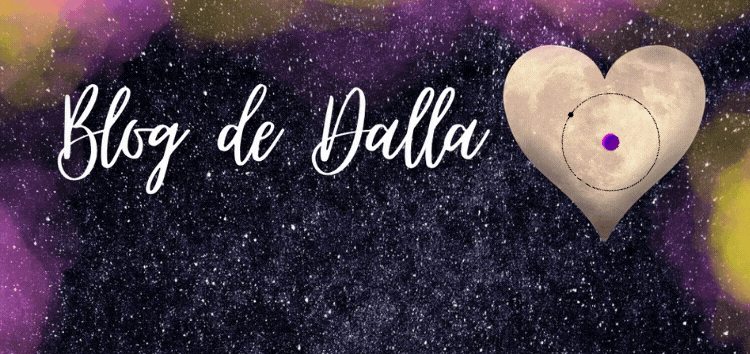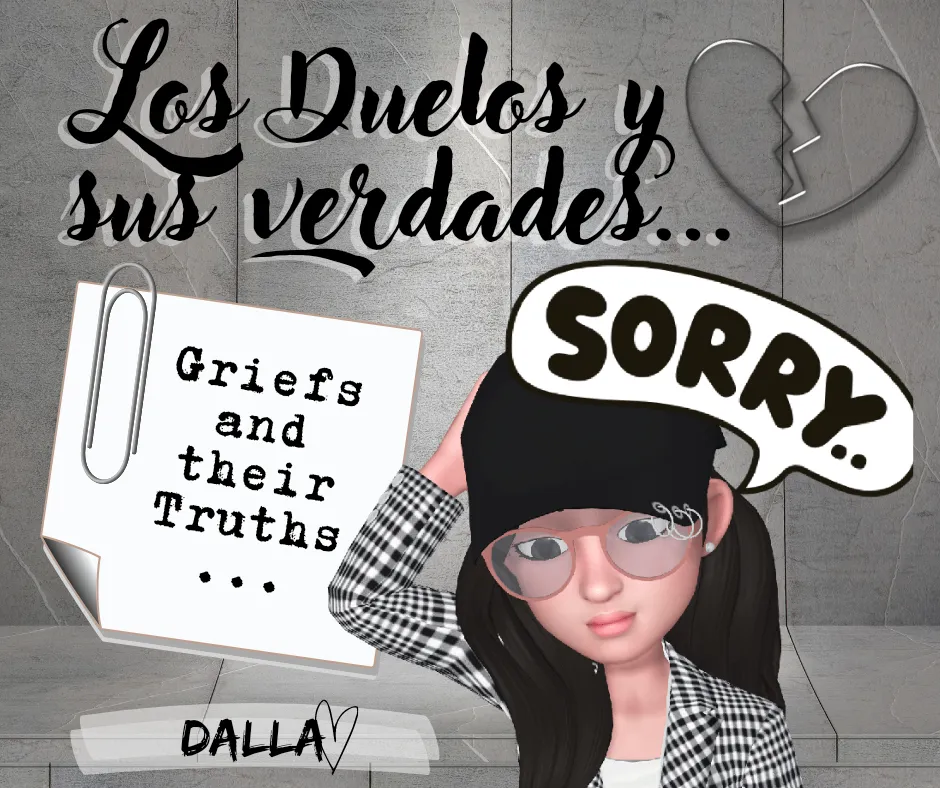

Estoy segura de que esta interrogante se la debe hacer cada ser humano sano mentalmente por lo menos una vez en su vida, y es por eso que vengo hablarles de esto…
Les hablaré primero como la Dalla humana, la Dalla que a pesar de saber algo de teoría y práctica en salud mental, ha tenido muchas experiencias propias en su vida tanto buenas como malas.
La Dalla que les escribe hoy ha pasado pocos duelos en su vida personal, y le ha costado demasiado superarlos, en definitiva no soy el mejor ejemplo para nadie con respecto a eso, de hecho, uno de mis duelos se convirtió en algo patológico y terminó en una Depresión porque me fue imposible superarlo.
Aun cuando nunca superé del todo ese duelo logré hacerlo llevadero, pero, en ese proceso debí pasar por otros y me siguió costando igual superarlos. Para empeorar un poco más mi panorama, por el destino o quien sabe que clase de paradoja extraña, los duelos me terminaron acompañando constantemente aun cuando no eran directamente míos, y es que decidí dedicarme a una profesión donde muchas personas van a fallecer quieras o no.
En medicina aprendemos mucho para poder sanar personas pero, aunque ustedes no lo crean, no nos enseñan a aprender a aceptar con resignación no poder sanarlas; para nosotros es igual de frustrante que para ustedes cuando se nos va una vida de las manos.
Así que, la realidad es que si tenemos mucho tiempo atendiendo a alguien, lo conocemos y hasta nos convertimos en sus amigos, nos duele y ¡mucho! porque somos todos humanos al fin y al cabo. Por supuesto el proceso de aceptación es mucho más fácil para mi que para los familiares directos de ese al que se le fue alguien.
Siempre recuerdo en el postgrado una compañera que, teniendo ya unos 5 años de graduada de médico, en una clase de "Dilemas morales en Medicina" y "Medicina Paliativa" le preguntó al jefe del Servicio de Psiquiatría delante de todos los otros residentes y muchos especialistas: ¿Qué podríamos decirle a una persona cuando su familiar no tiene esperanza de vida?¿Cómo le decimos a una persona que su familiar muy probablemente va a fallecer?, ¿Cómo se lo decimos a esa persona enferma que está llegando a su final? La respuesta a su pregunta ustedes nunca se la van a imaginar, solo fue un silencio sepulcral, no hubo ninguna respuesta.
Casi todos quedamos callados viendonos a las caras analizando tal pregunta, en ese momento todo ese sin fin de momentos difíciles en mi vida pasó por mi mente como un carrusel de una película, iba viendo escena tras escena, una detrás de otra, la cantidad de veces que tuve que decir esas palabras en mi vida sin saber cómo hacerlo y por consiguiente con mucho miedo, pensando hasta ese momento que sencillamente yo era extremadamente sensible, empática y se me dificultaba sólo a mí decir esas malas noticias.
I am sure that this question must be asked by every mentally healthy human being at least once in his life, and that is why I come to talk to you about this....
I will speak to you first as the human Dalla, the Dalla who in spite of knowing some theory and practice in mental health, has had many experiences of her own in her life, both good and bad.
The Dalla who writes to you today has had few duels in her personal life, and has had a hard time overcoming them, I am definitely not the best example for anyone in that respect, in fact, one of my duels became pathological and ended in a Depression because it was impossible for me to overcome it.
Even though I never completely overcame that grief I managed to make it bearable, but, in that process I had to go through others and it was still hard for me to overcome them. To make my situation a little worse, by fate or who knows what kind of strange paradox, grief ended up accompanying me constantly even when it was not directly mine, and I decided to dedicate myself to a profession where many people are going to die whether you want them to or not.
In medicine we learn a lot to be able to heal people but, believe it or not, they do not teach us to learn to accept with resignation not being able to heal them; for us it is just as frustrating as it is for you when a life slips through our hands.
So, the reality is that if we have been caring for someone for a long time, we know them and we even become their friends, it hurts us, and a lot! Of course the process of acceptance is much easier for me than it is for the immediate family members of the departed.
I always remember in graduate school a colleague who, having already graduated as a doctor for about 5 years, in a class on "Moral Dilemmas in Medicine" and "Palliative Medicine" asked the head of the Psychiatry Department in front of all the other residents and many specialists: What can we say to a person when their relative has no hope of life, how do we tell a person that their relative is most likely going to die, how do we tell that sick person that they are reaching the end of their life, how do we tell that person that they are coming to the end? The answer to his question you will never imagine, it was just a sepulchral silence, there was no answer.
Almost all of us were silent looking at each other's faces analyzing such a question, at that moment all those endless difficult moments in my life went through my mind like a carousel of a movie, I was watching scene after scene, one after another, the number of times I had to say those words in my life without knowing how to do it and therefore with a lot of fear, thinking until that moment that I was simply extremely sensitive, empathic and it was difficult for me alone to say that bad news.

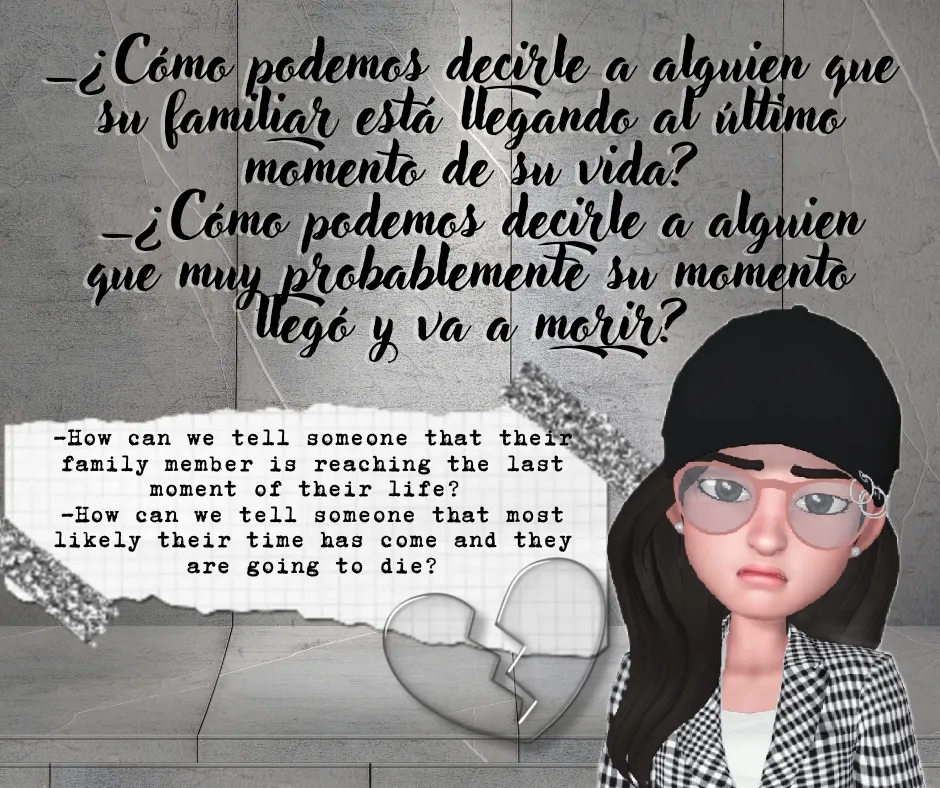

Ese día lo entendí después que salimos de ahí y hablamos todos entre nosotros, realmente nunca nos hablaron de eso, nunca hubo una clase para prepararnos ante un duelo futuro nuestro o de alguien cercano y menos de algún paciente.
Nunca nos enseñaron cómo o qué hacer para dar tal tipo de noticias, todos, tanto los que tenía poca experiencia como los que tenían mucha, estuvieron de acuerdo en que realmente ¡ninguno sabía cómo hacerlo! y que solo debimos aprender sobre la marcha, debimos solo seguir nuestros instintos de humanidad en esos momentos.
Muchos podrán pensar que damos ese tipo de noticias, nos damos la vuelta y nos vamos, somos de hierro y no nos importa nada, pero están muy alejados de la realidad, muchas veces no tenemos tiempo para siquiera pensar en eso y otras muchas veces conscientemente lo bloqueamos, pero otras muchas veces nos duele y nos puede llegar a afectar demasiado.
Hay algunos, como los que escogen una especialidad como la mía, "Geriatría y Gerontología" en la que pareciera que la muerte siempre anda rondando, es difícil aceptar esto amigos, pero es la realidad, desde que conocemos a una persona en la consulta, sin querer, automáticamente lo primero que hacemos es calcular mentalmente la esperanza de vida de ella para determinar qué tanta relación podemos desarrollar con esa persona y que su pérdida nos afecte tanto después.
¿Tienes una mejor estrategia que esa? Si la tienes por favor dimela porque yo no lo sé, tranquilo, eso no implica que cambiemos nuestra forma de actuar, no nos convertimos en seres menos o más empáticos, sencillamente nos obligamos a ser al extremo realistas para proteger nuestra psique un poco y poder establecer estrategias realistas de tratamiento para ese paciente.
Existe una escala muy cruel que pocos alguna vez les van a dar a ustedes a conocer, se llama; Escala de Karnofsky, esta es una escala que usamos en medicina bastante lúgubre, por cierto, que nos permite determinar la esperanza de vida que tiene una persona con una enfermedad de curso crónico, pero que está llegando a su etapa final como el cáncer, por ejemplo; en términos sencillos nos permite determinar un índice predictor de mortalidad.
I understood that day after we left there and we all talked among ourselves, they never really talked to us about it, there was never a class to prepare us for a future bereavement of our own or of someone close to us, let alone of a patient.
We were never taught how or what to do to give that kind of news, everyone, both those who had little experience and those who had a lot of experience, agreed that none of us really knew how to do it! and that we just had to learn as we went along, we just had to follow our instincts of humanity in those moments.
Many may think that we give that kind of news, we turn around and leave, we are iron and do not care about anything, but they are far from reality, many times we do not have time to even think about it and many times we consciously block it, but many times it hurts us and can affect us too much.
There are some, like those who choose a specialty like mine, "Geriatrics and Gerontology" in which it seems that death is always around, it is difficult to accept this friends, but it is the reality, since we meet a person in the office, without wanting to, automatically the first thing we do is to mentally calculate the life expectancy of that person to determine how much relationship we can develop with that person and that their loss will affect us so much later.
Do you have a better strategy than that? If you do, please tell me because I don't know, relax, that does not imply that we change the way we act, we do not become less or more empathetic, we simply force ourselves to be realistic to the extreme in order to protect our psyche a little and to be able to establish realistic treatment strategies for that patient.
There is a very cruel scale that few will ever let you know about, it is called; Karnofsky Scale, this is a scale that we use in medicine, quite dismal, by the way, that allows us to determine the life expectancy of a person with a chronic disease, but that is reaching its final stage such as cancer, for example; in simple terms it allows us to determine a predictive index of mortality.

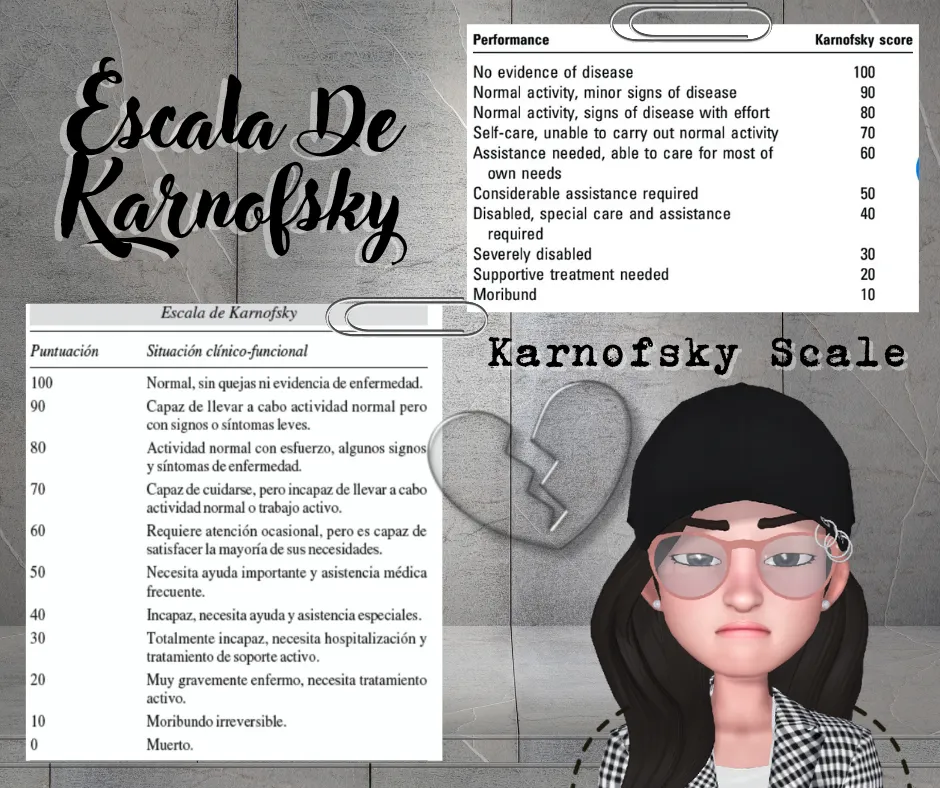

En muchas especialidades casi nunca la usan, algunas de seguro ni la recuerdan porque es tan deprimente que muchos sencillamente la dejan pasar y esperan no tener que usarla jamás, pero en Geriatría lamentablemente nos vemos obligados a usarla de forma bastante frecuente. Llega el punto en el que ya ni siquiera hacemos ningún cálculo, ni la aplicamos totalmente, ya al evaluar al paciente lo sabemos, y es ahí cuando se abre la dificultad nuevamente de ¿Cómo dar la mala noticia? Esa que nunca nos enseñaron a dar, esa que mi compañera preguntó esa vez en esa clase.
No nos queda de otra, evidentemente intentamos acostumbrarnos al proceso, tratar de verlo como una etapa más de la vida, algo que no podemos remediar, y un trabajo que, aunque sea muy duro, alguien tiene que realizar. Así que lo hacemos y, aunque no queramos, poco a poco también vamos aprendiendo de lo malo, sabemos que no podemos relacionarnos demasiado con ese otro porque el momento de dar esa mala noticia va a llegar y nos dolerá ese duelo tanto por el paciente como por el familiar.
Todo esto que les digo es para tratar de lidiar con el duelo de terceros, pero cuando el duelo es directo ninguna de estas técnicas parece funcionar, jamás podremos acostumbrarnos, no podemos hacer esa distancia mental entre la relación que tenemos con quienes queremos pensando que algún día se irán.
Algunos podrán asegurarles que están preparados para ese momento, pero ese mismo en pleno duelo puede desarrollar una crisis que nunca pensó que iba a desarrollar, otros pueden pensar toda su vida que al pasarlo sentirán que morirán del dolor, pero terminan siendo extremadamente fuertes y lo superan más rápido que esos otros. Esto es sencillamente porque ese proceso nunca depende completamente de la consciencia y nuestro autocontrol.
Por eso, aun con toda mi experiencia viendo duelos en otros, y aprendiendo mucho de teoría sobre cómo sobrellevarlos, es que aun me duele demasiado pasar nuevamente por otro, porque la realidad es que cuando ocurre se te olvida todo lo que has vivido, visto o aprendido y tu psique sólo se concentra en mantenerte vivo para que no te consuma el dolor más allá de lo debido.
In many specialties it is almost never used, some surely do not even remember it because it is so depressing that many simply let it go and hope they never have to use it, but in Geriatrics we are unfortunately forced to use it quite frequently. It gets to the point where we do not even make any calculations, nor do we apply it completely, since we already know it when we evaluate the patient, and that is when the difficulty of how to give the bad news opens up again? The one that we were never taught to give, the one that my colleague asked that time in that class.
We have no choice, obviously we try to get used to the process, try to see it as just another stage of life, something we cannot remedy, and a job that, even if it is very hard, someone has to do it. So we do it and, although we do not want to, little by little we also learn from the bad, we know that we cannot relate too much with that other person because the moment of giving that bad news will come and we will grieve for the patient as well as for the family member.
All this I am telling you is to try to deal with third party grief, but when the grief is direct none of these techniques seem to work, we can never get used to it, we cannot make that mental distance between the relationship we have with those we love thinking that someday they will be gone.
Some may assure you that they are prepared for that moment, but that same person in the midst of grief may develop a crisis that they never thought they would develop, others may think all their lives that they will die of grief, but they end up being extremely strong and overcome it faster than those others. This is simply because that process is never completely dependent on consciousness and our self-control.
That is why, even with all my experience seeing others grieve, and learning a lot of theory on how to cope with it, it still hurts too much to go through another one, because the reality is that when it happens you forget everything you have lived, seen or learned and your psyche only concentrates on keeping you alive so that you are not consumed by the pain beyond what you should be.

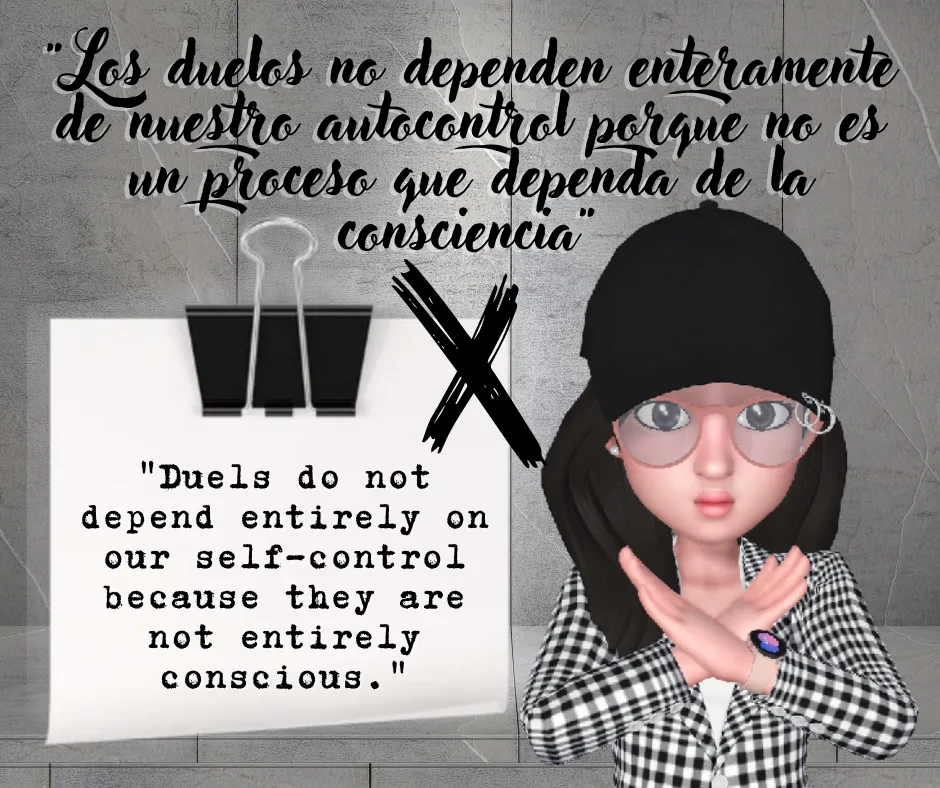

En esa búsqueda durante algunos años de mi juventud tratando de superar ese duelo patológico que les contaba leí y escuché muchísimo, aprendí mucho, fui a terapias de todo tipo, buscaba respuestas a muchas interrogantes que me hacía a mi misma, a Dios, al mundo y al universo, pero las respuestas nunca llegaron y fue ahí, después de estar muy agotada y sintiéndome tan mal emocionalmente, que lo entendí.
Lo que entendí fue la mayor de las verdades que cualquiera les podrá decir alguna vez con respecto a los duelos amigos "tristemente no existe la fórmula perfecta para superar ningún tipo de duelo, ni en todos ocurre por igual"
No hablo solo de pérdida de vidas, hablo de pérdidas de cualquier tipo, sea la ida de un hijo a vivir lejos de su familia, el mudarse a un lugar nuevo, desconocido, la pérdida de una mascota, la separación en una relación de pareja, etc, etc, hablo de cualquier tipo de separaciones o pérdidas bruscas para las que nunca estuvieras preparado emocionalmente.
Esa es la verdad amigos "Nadie tiene la esa guía perfecta para superar duelos" ¡no existe! ni siquiera tenemos una fórmula perfecta para reconfortar a otros cuando ellos están pasando por sus propios duelos, por eso siempre insistimos en que "se den su espacio y su tiempo para vivir adecuadamente su dolor"
Cada persona es diferente, algunas son más o menos sensibles, desarrollan más o menos apego, son más o menos independientes, más o menos fuertes emocionalmente, todo es variable, tanto en esos extremos, como en las escalas de intensidad de esas características en cada uno.
In that search during some years of my youth trying to overcome that pathological grief that I was telling you about, I read and listened a lot, I learned a lot, I went to therapies of all kinds, I was looking for answers to many questions that I asked myself, to God, to the world and the universe, but the answers never came and it was there, after being very exhausted and feeling so bad emotionally, that I understood it.
What I understood was the greatest truth that anyone can ever tell you about grief friends "sadly there is no perfect formula for overcoming any kind of grief, nor does it happen equally in everyone."
I am not only talking about loss of life, I am talking about losses of any kind, whether it is the departure of a child to live far away from his family, moving to a new, unknown place, the loss of a pet, the separation in a relationship, etc, etc, I am talking about any kind of separations or sudden losses for which you were never emotionally prepared.
That's the truth friends "Nobody has the perfect guide to overcome grief", it doesn't exist! We don't even have a perfect formula to comfort others when they are going through their own grief, that's why we always insist that they "give themselves space and time to live their grief properly".
Each person is different, some are more or less sensitive, develop more or less attachment, are more or less independent, more or less emotionally strong, everything is variable, both in those extremes, as well as in the scales of intensity of those characteristics in each one.

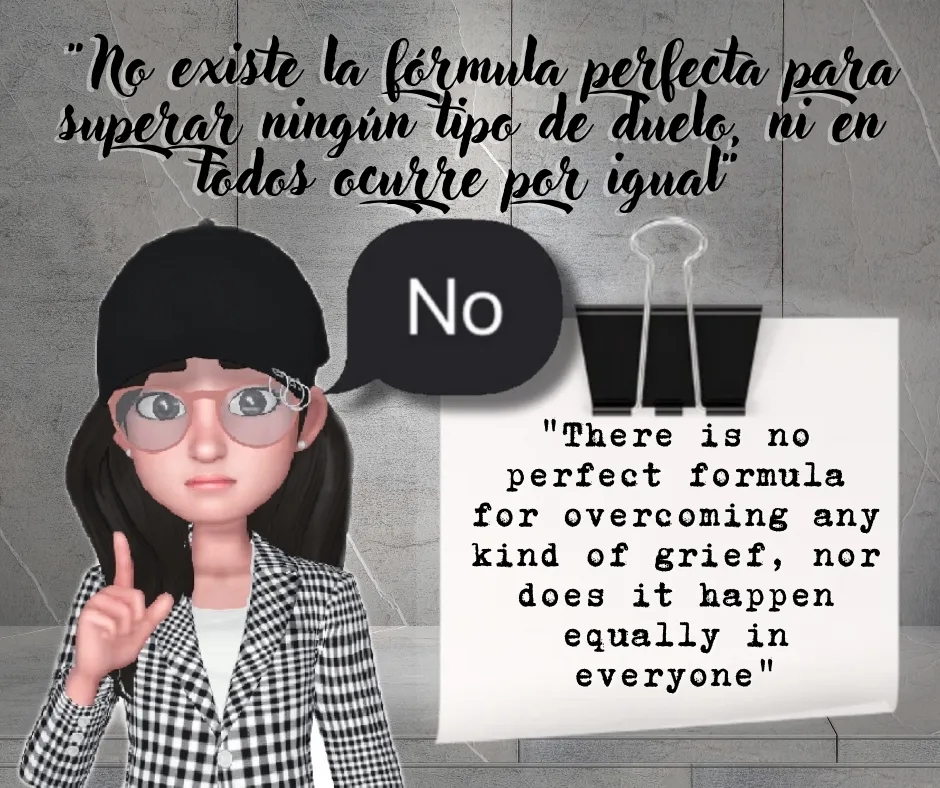

Y es que la realidad es que no todos sentimos igual ni a la misma intensidad, algunos pueden demostrar todo el tiempo lo que significa el tener ese objeto o persona consigo y ser evidente su nivel de sensibilidad, habrán otros que no les importará tanto desprenderse de ese objeto amado porque tienen menor nivel de sensibilidad o sencillamente se adaptan más rápido a los cambios, así como existen algunos que no entenderán lo que significa para ellos ese objeto hasta que ya no lo sientan consigo.
Esta alta variabilidad entre cada persona es lo que nos hace difícil establecer una especie de "Protocolo de Tratamiento" para "curar los duelos", así que mi querido hiver que estas leyendo esto y estás pasando por un duelo, debes saber que la mejor recomendación que te puede dar alguien es que "no te compares con nadie", si te sientes decaído, si no tienes ánimo de hacer nada, si no estás rindiendo igual de siempre en la universidad, en el trabajo, si no puedes dormir bien, si solo tienes ganas de llorar, "Está bien, date tu tiempo, es tu proceso y no se tiene que parecer al de nadie"
Lo más importante en los duelos es ser compasivos con nosotros mismos, tomarnos nuestro espacio y tiempo para reconstruirnos sobre las ruinas emocionales que quedaron en el vacío.
Para volver a ser nosotros mismos, el mejor de los consejos que te puedo dar en base a la experiencia que he tenido sobrellevando un duelo patológico y que nadie a mi me dijo es: "Vive tu duelo profundamente sin intentar hacerte el fuerte durante un breve tiempo, pero después de ese tiempo debes empezar a tratar de seguir con tu vida, así sea sobrellevando ese dolor hasta que eventualmente no te afecte tanto"
Si hubiera sabido esa pequeña frase cuando yo era muy joven me habría librado de muchas cosas que pasé en ese entonces, pero nadie me lo dijo y yo tampoco lo pregunté porque no quise decirle a nadie cómo me sentía para no preocuparlos y evitar ser juzgada por ser débil o, peor aún, generar lástima.
And the reality is that we do not all feel the same or at the same intensity, some can show all the time what it means to have that object or person with them and their level of sensitivity is evident, there will be others who will not mind so much to let go of that loved object because they have a lower level of sensitivity or simply adapt faster to changes, as well as there are some who will not understand what that object means to them until they no longer feel it with them.
This high variability between each person is what makes it difficult for us to establish a kind of "Treatment Protocol" to "cure grief", so my dear hiver you are reading this and you are going through a grief, you should know that the best recommendation that someone can give you is that "do not compare yourself with anyone", if you feel down, if you don't feel like doing anything, if you are not performing the same as always in college, at work, if you can't sleep well, if you just feel like crying, "It's ok, take your time, it's your process and it doesn't have to be like anybody else's".
The most important thing in grief is to be compassionate with ourselves, to take our space and time to rebuild ourselves on the emotional ruins left in the void.
To get back to being ourselves, the best advice I can give you based on the experience I have had coping with pathological grief that no one told me is: "Live your grief deeply without trying to act tough for a short time, but after that time you should start trying to get on with your life, even if it is just coping with the pain until eventually it doesn't affect you as much".
If I had known that little phrase when I was very young I would have been spared a lot of things I went through back then, but no one told me and I didn't ask either because I didn't want to tell anyone how I felt so as not to worry them and avoid being judged for being weak or, worse, generating pity.

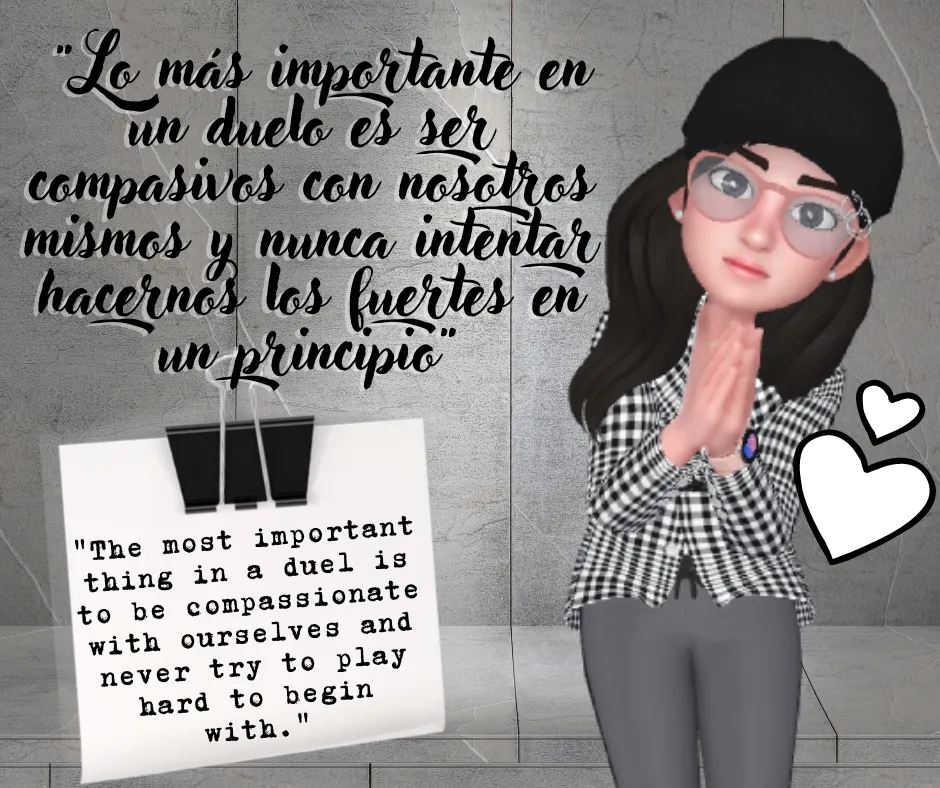

Para algunos esto que les estoy contando puede parecer un drama, pero no es nada de eso, estoy hablándoles muy seriamente en base a mi experiencia y contándoles por lo que he pasado para que ustedes aprendan de mí lo que no deben hacer y el por qué en la actualidad se me dificulta sobrellevar un duelo, aun cuando "debería" estar acostumbrada a pasar por ellos.
Soy fiel creyente de que, de nada sirve aprender cosas difíciles en la vida y quedarnos con ese conocimiento solo nosotros, si no intentamos replicar ese conocimiento en otros; además para llegar a hablar de esto tan abiertamente aquí créanme mis queridos hivers, me costó ¡demasiado! Debí alcanzar muchísimas madurez emocional hace algún tiempo, y estoy consciente de que no todos entienden estos procesos y mientras lo entienden no quiero que se presionen demasiado sobre un estado que, si bien puedes ayudarte a ti mismo a salir de él, no depende enteramente de ti.
Por supuesto una vez que hayas pasado tu mayor estado de tristeza debes seguir con tu vida, vuelve a esas cosas que antes te hacían feliz, rodéate de personas que sabes que te aprecian y quieren lo mejor para ti, intenta recordar esa persona u objeto amado de forma positiva o como algo de crecimiento que llegó y se tuvo que ir ¡por favor inténtalo! sé que es difícil, pero debes intentarlo, tomate tu tiempo, pero luego de eso ¡inténtalo! eventualmente sin siquiera darte cuenta, lo habrás dejado atrás.
Finalmente quiero que te quedes con algo, todo lo que dije arriba es real, es tu proceso, tu tiempo y tu espacio, pero ¡por favor! se consciente de que el proceso no puede durar demasiado ¿Cuánto tiempo? Lamento informarte que la respuesta a esto es variable, depende del nivel de apego que hayas tenido, de lo significativo que haya sido ese objeto amado para ti, de lo sensible que seas, de cómo ocurrió el proceso de separación y de las dificultades que se te anexen en el camino.
For some people what I am telling you may seem like a drama, but it is nothing like that, I am talking to you very seriously based on my experience and telling you what I have been through so that you can learn from me what you should not do and why it is difficult for me to cope with grief, even when I "should" be used to go through them.
I am a true believer that it is useless to learn difficult things in life and keep that knowledge to ourselves, if we do not try to replicate that knowledge in others; besides, to be able to talk about this so openly here, believe me my dear hivers, it cost me too much! I must have reached a lot of emotional maturity some time ago, and I am aware that not everyone understands these processes and while you do I don't want you to put too much pressure on yourself about a state that, while you can help yourself out of it, is not entirely up to you.
Of course once you are past your major state of sadness you must move on with your life, go back to those things that used to make you happy, surround yourself with people that you know appreciate you and want the best for you, try to remember that loved person or object in a positive way or as something of growth that came and had to go please try! I know it is hard, but you must try, take your time, but after that try! eventually without even realizing it, you will have put it behind you.
Finally I want you to stay with something, everything I said above is real, it's your process, your time and your space, but please! be aware that the process can't last too long. I regret to inform you that the answer to this is variable, it depends on the level of attachment you have had, how significant that loved one has been to you, how sensitive you are, how the process of separation occurred and the difficulties that are attached to you along the way.

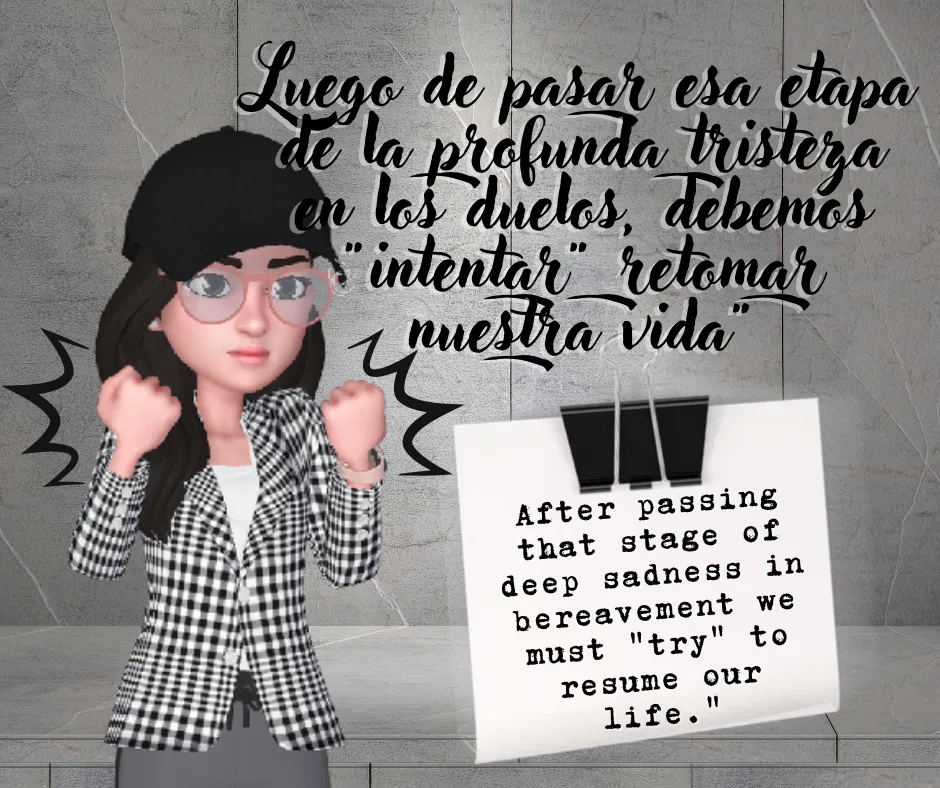

Hoy no sólo quise dejar este escrito plasmado aquí para proporcionarles con mucho cariño, sensibilidad y madurez estos conocimientos que con la experiencia he adquirido, sino también como recuerdo de autoapoyo, ya que en mi proceso, aun con lo doloroso que es, lo sigo intentando cada día, seguiré haciéndolo y estoy segura de que aun cuando no sepa cuándo, ni cómo ¡lo superaré!
Desde hace un tiempo he pensado que, tal vez, al final el haberme dedicado a esto y el ver esos otros muchos duelos en tantas personas, me ha servido de ayuda para recordar que siempre hay un mañana y que, en aun cuando no me de cuenta del todo en el momento, he aprendido a sobrellevar mejor nuevas pérdidas así como esos otros muchos lo han hecho con las suyas, después de todo terminan siendo ejemplos esperanzadores para mi de que ese momento de resignación siempre llega, tarda un poco más en mí, pero ¡llega!
Today I not only wanted to leave this writing here to provide you with much affection, sensitivity and maturity with this knowledge that I have acquired through experience, but also as a reminder of self-support, since in my process, even as painful as it is, I keep trying every day, I will keep doing it and I am sure that even if I do not know when or how, I will overcome it!
For some time now I have been thinking that, perhaps, in the end, having dedicated myself to this and seeing those many other bereavements in so many people, has helped me to remember that there is always a tomorrow and that, even when I do not fully realize it at the moment, I have learned to cope better with new losses, just as those many others have done with theirs, after all they end up being hopeful examples for me that that moment always comes, it takes a little longer in me, but it comes!

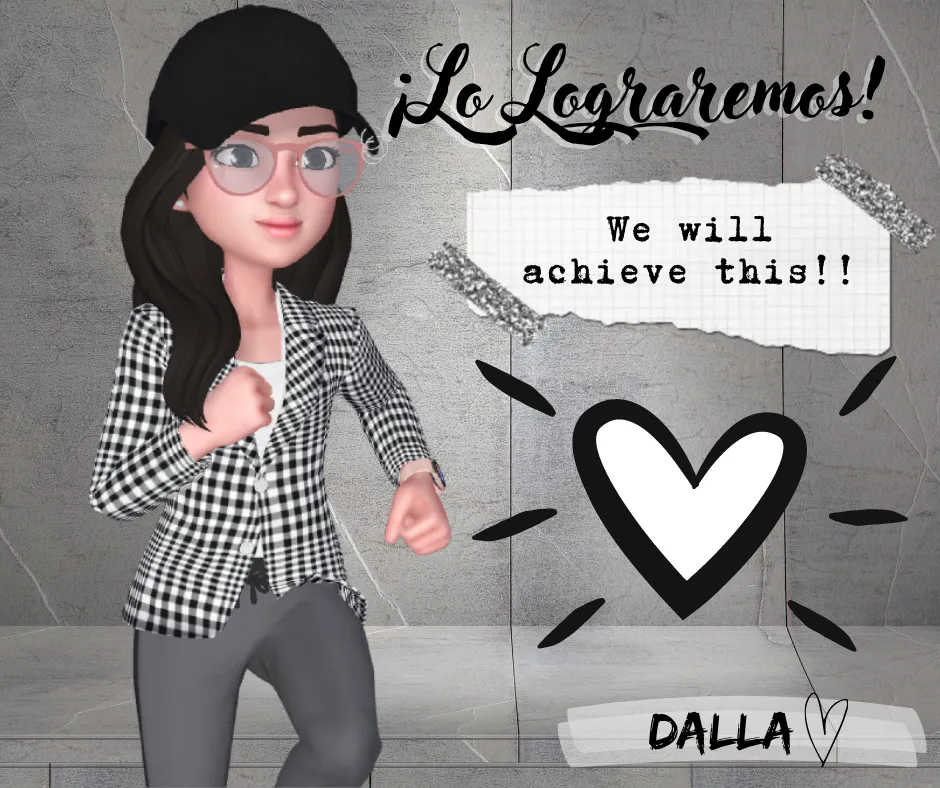


Todas las imágenes fueron creadas por @liveofdalla usando Canvas y Picsart con recursos gratuitos de ambas Apps.
(Eng) All images were created by @liveofdalla using Canvas and Picsart with free resources from both Apps.
DeepL
